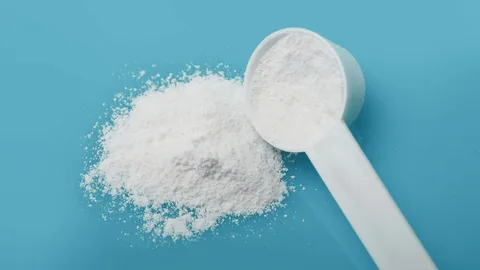Introduction
Creatine is one of the most researched and widely used supplements in the fitness and sports industry. It is known for its ability to enhance athletic performance, increase muscle mass, and improve strength and power output. However, concerns about potential side effects and safety issues arise, particularly regarding the dosage and long-term use of creatine supplementation. In this comprehensive guide, we will delve into the science behind creatine supplementation, explore its potential side effects, discuss recommended dosages, and provide evidence-based insights into its safety profile.
Understanding Creatine: What Is It and How Does It Work?
Creatine is a naturally occurring compound found in small amounts in various foods, such as red meat and fish, as well as synthesized in the human body from amino acids. It plays a crucial role in cellular energy metabolism, particularly during short-duration, high-intensity activities like weightlifting and sprinting. Creatine supplementation increases the body’s stores of creatine phosphate, a key energy substrate used during intense physical exertion, thereby enhancing performance and muscle recovery.
The Benefits of Creatine Supplementation
Creatine supplementation has been extensively studied and shown to offer several benefits for athletes and active individuals, including
Increased Muscle Mass
Creatine supplementation can lead to greater muscle hypertrophy and gains in lean body mass, particularly when combined with resistance training.
Improved Strength and Power
Creatine enhances muscle strength and power output, allowing individuals to lift heavier weights and perform explosive movements with greater force and speed.
Enhanced Exercise Performance
Creatine supplementation improves performance in high-intensity, short-duration activities like sprinting, jumping, and weightlifting, by providing a readily available source of energy for muscle contractions.
Faster Muscle Recovery
Creatine supplementation may reduce muscle damage and inflammation following intense exercise, leading to faster recovery times and less soreness between workouts.
Potential Side Effects of Creatine
While creatine is generally considered safe for most people when used as directed, some individuals may experience mild side effects, including:
Gastrointestinal Distress
Some people may experience gastrointestinal issues such as bloating, gas, diarrhea, or stomach discomfort when taking creatine supplements, particularly in higher doses or with inadequate hydration.
Weight Gain
Creatine supplementation can cause temporary water retention within muscle cells, leading to a slight increase in body weight, which may be perceived as bloating or swelling.
Kidney Strain
There is a common misconception that creatine supplementation can harm kidney function or cause kidney damage. However, numerous studies have shown that creatine is safe for healthy individuals with normal kidney function when used as directed.
Safety Considerations and Dosage Guidelines
When used responsibly and according to recommended guidelines, creatine supplementation is considered safe for most individuals. The International Society of Sports Nutrition (ISSN) provides the following dosage guidelines for creatine supplementation:
Loading Phase
To rapidly increase muscle creatine stores, a loading phase of 20 grams per day (divided into 4 doses of 5 grams each) for 5-7 days is recommended.
Maintenance Phase
Following the loading phase, a maintenance dose of 3-5 grams per day is recommended to sustain elevated creatine levels in muscle tissue.
Cycling
Some individuals choose to cycle creatine supplementation by taking it for several weeks or months followed by a period of rest to allow natural creatine synthesis to resume. However, cycling is not necessary for everyone and may not provide additional benefits.
Debunking Common Myths About Creatine
Despite its widespread use and extensive research, several myths and misconceptions persist regarding creatine supplementation:
Myth
Creatine is a steroid or illegal performance-enhancing drug.
Fact
Creatine is a naturally occurring compound found in foods and synthesized by the body. It is not a steroid or banned substance and is widely accepted as a safe and effective dietary supplement for athletes and fitness enthusiasts.
Myth
Creatine causes dehydration and muscle cramps.
Fact
Creatine supplementation may increase muscle hydration and intracellular water content, which can actually help prevent dehydration and muscle cramps during intense exercise when adequate fluid intake is maintained.
Practical Tips for Safe and Effective Creatine Use
Stay Hydrated
Drink plenty of water throughout the day, especially when taking creatine supplements, to prevent dehydration and minimize the risk of gastrointestinal side effects.
Choose Quality Products
Select creatine supplements from reputable brands that undergo third-party testing for purity, potency, and safety to ensure product quality and efficacy.
Mobnitor Your Progress
Keep track of your workouts, performance improvements, and any side effects or changes in how you feel while taking creatine supplements to gauge their effectiveness and adjust your dosage as needed.
Combine with Proper Nutrition and Training
Creatine supplementation works best when combined with a balanced diet rich in protein and carbohydrates and a structured exercise program that includes resistance training and high-intensity activities.
FAQs
Can you take too much creatine?
While creatine is generally safe for most people when used as directed, taking excessively high doses may increase the risk of gastrointestinal side effects and may not provide additional benefits. Stick to recommended dosages and avoid megadosing to minimize the risk of side effects.
Can creatine cause hair loss?
There is no scientific evidence to suggest that creatine supplementation causes hair loss. Hair loss can be influenced by various factors such as genetics, hormones, and overall health, but creatine is not among them.
Is creatine safe for teenagers?
Creatine supplementation is generally considered safe for healthy teenagers involved in sports and resistance training. However, it is essential to consult with a healthcare professional or qualified sports nutritionist before starting any new supplement regimen, especially for younger individuals.
Can women take creatine?
Yes, creatine supplementation is safe and effective for women who engage in resistance training or high-intensity exercise. It can help improve strength, muscle mass, and exercise performance, similar to its effects in men.
Can creatine help with weight loss?
Creatine supplementation is not specifically designed for weight loss, but it may indirectly support weight management by increasing muscle mass, boosting metabolism, and enhancing exercise performance, leading to greater calorie burn and fat loss over time.
Is creatine safe for long-term use?
Research indicates that creatine supplementation is safe for long-term use when used as directed and in recommended dosages. Numerous studies have investigated the safety and efficacy of creatine supplementation over extended periods, with no significant adverse effects reported in healthy individuals.
Conclusion
In conclusion, creatine supplementation is a safe and effective way to enhance athletic performance, increase muscle mass, and improve strength and power output. When used responsibly and according to recommended guidelines, creatine supplementation offers numerous benefits for athletes and active individuals without significant side effects or safety concerns. By understanding the science behind creatine, debunking common myths, and following practical tips for safe and effective use, you can harness the power of creatine to optimize your training and achieve your fitness goals with confidence and peace of mind.
- Kratom Capsules Vs Powder: Which One Is Right For You? - June 1, 2025
- Jaw Fillers For A Defined Jawline Near Pirbright, Surrey - May 31, 2025
- Skin Treatment & Skincare Consultations Near Stanwell, Surrey - May 31, 2025




